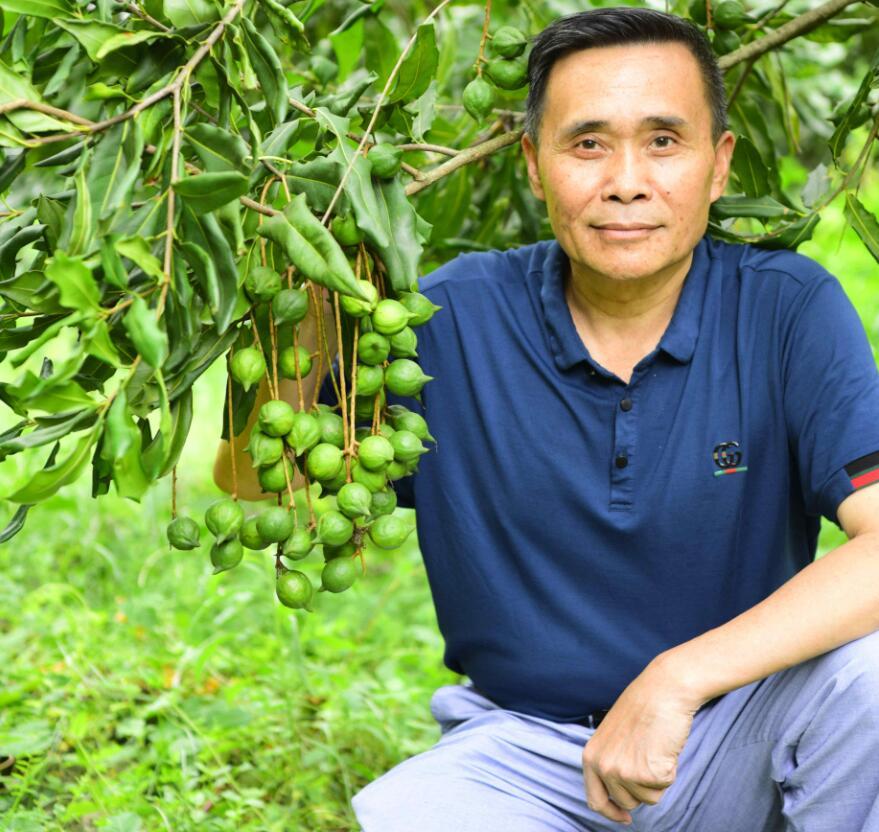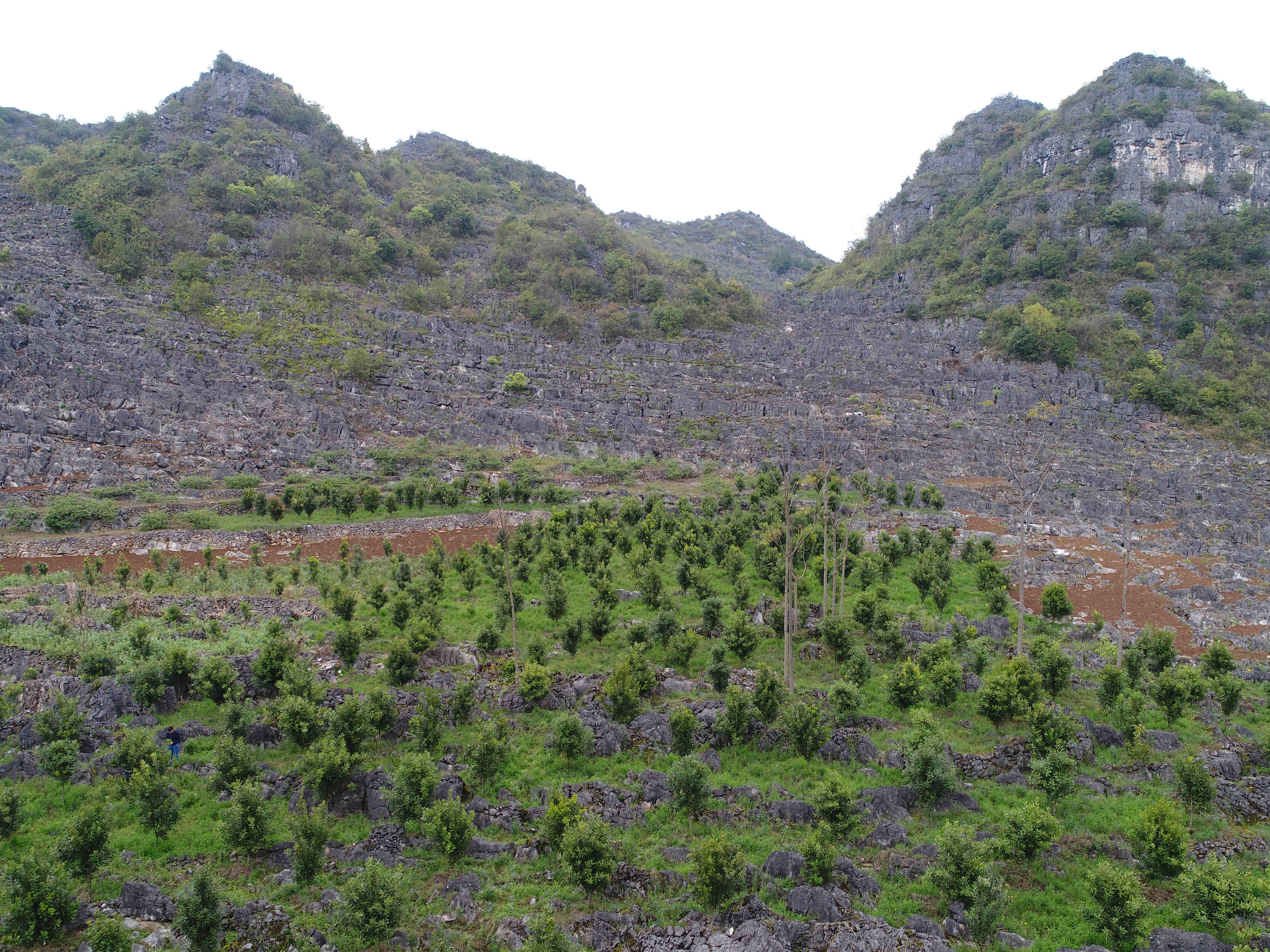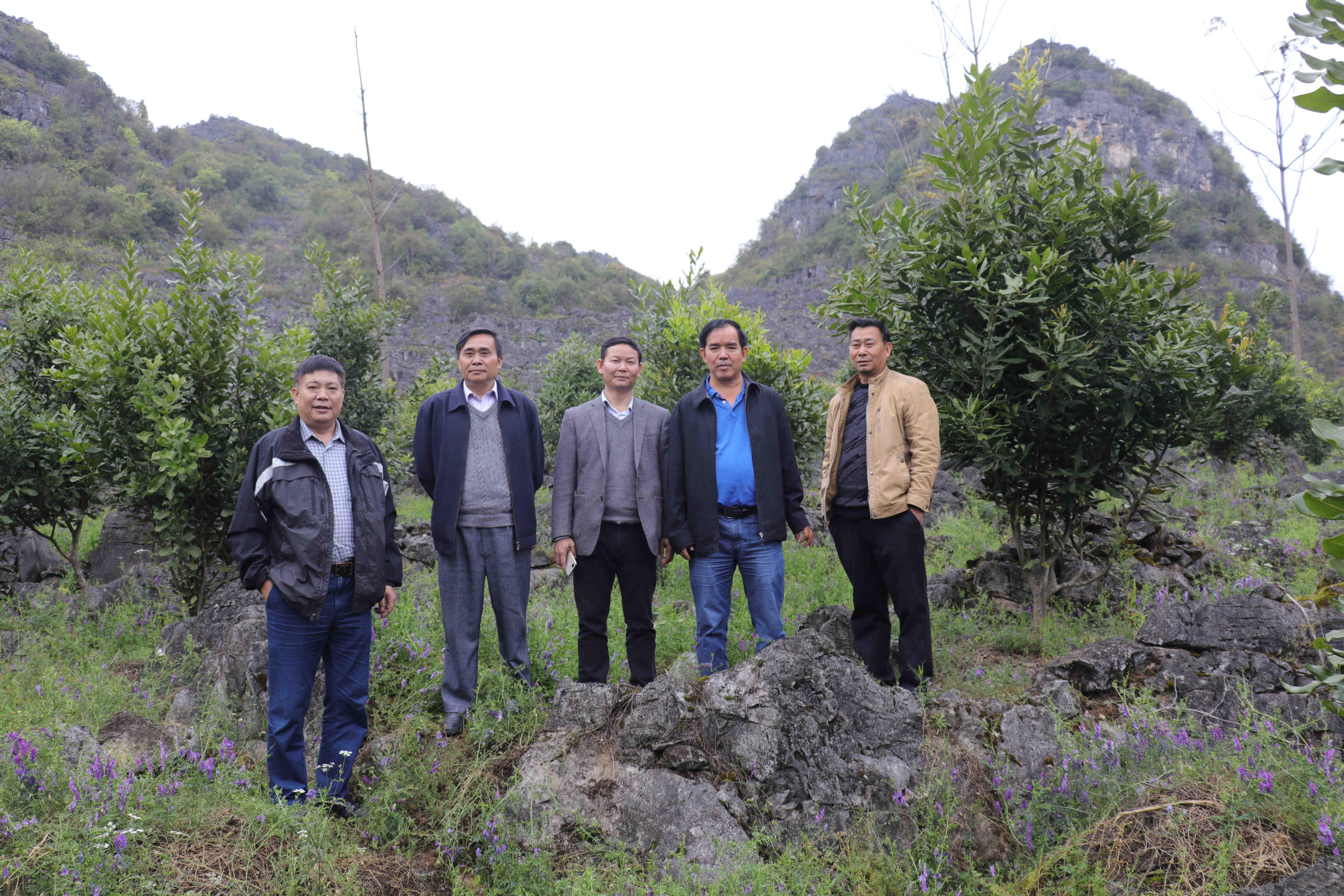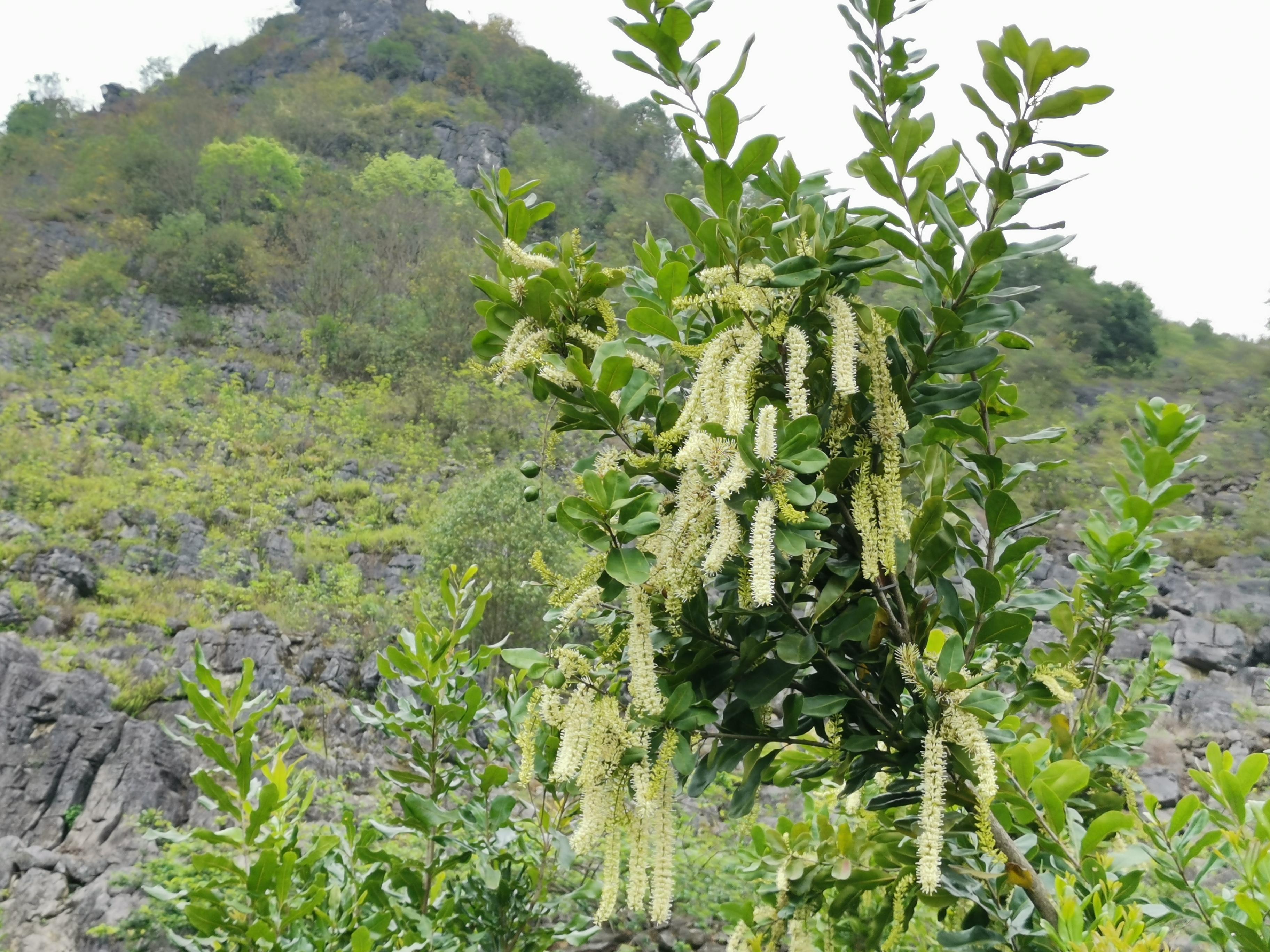
Lei Chaoyun, former director of the Guizhou Institute of Subtropical Crops, Guizhou Academy of Agricultural Sciences, poses in front of some of the first macadamia trees that he planted in his karst-filled hometown of Xianahui Village, Wanfenglin Subdistrict, Xingyi City, Qianxinan Bouyei and Miao Autonomous Prefecture, Guizhou Province.
One of the three major karst landforms in southwest China, the subtropical Wanfenglin Scenic Area , whose names translates to "forest of ten thousand peaks," spans 2,000 sq. km of southeast Xingyi City, capital of Qianxinan (which means "southwest Guizhou" as "Qian" is another name for the province) Bouyei and Miao Autonomous Prefecture , Guizhou Province, and is the largest and most typical karst peak forest in the country.
Less well-known than desertification, the rocky desertification, or human activities and other processes that result in a karst region covered by soil and vegetation to transform into a rocky landscape, that afflicts the area caused the corn that locals grew to yield very low outputs, thus resulting in widespread poverty in the area until recently.
A man who became an agronomist specialising in subtropical and tropical crops named Lei Chaoyun was born in a village nestled in the heart of Wanfenglin known as Xianahui in 1963. He left his hometown in order to begin his university studies in 1978, eventually became the director of the Guizhou Institute of Subtropical Crops, Guizhou Academy of Agricultural Sciences (GZAAS), and retired recently .
Lei had been thinking about ways he could help his fellow villagers increase their incomes while protecting the region's karst landscape against rocky desertification for a long while and ultimately determined that the exotic macadamia tree genus would be suited to the attainment of these goals based on his decades of research.
Sustainable and environmentally friendly, the evergreen trees are resilient, have low maintenance requirements and wide adaptability, and are suited to rocky desertification control efforts. They can be harvested once a year as long as they bear fruit, have a productive period of 70 to 80 years, enabling them to benefit two to three generations of people, and are capable of producing around 300 kg of fresh shelled nuts per mu per year during their peak fruiting period if the right varieties and methods are utilised. Lei wanted to pursue and demonstrate the macadamia industry in Wanfenglin and promote it in other areas if the endeavour proved to be a success.

A view of Xianahui when rocky desertification control efforts had just begun
The then-46-year-old scientist told Xianahui's residents about these ideas in 2009, but no one was willing to get involved because they were unsure if the trees would survive. Lei decided to buy a few dozen macadamia saplings from the Chinese Academy of Tropical Agricultural Sciences (CATAS) and plant them in his fields as an experiment, however. When the trees begun bearing fruit in 2013, the excited man told his neighbours about the results he was achieving, but they remained unconvinced due to the small size of his plot and continued to refuse to participate.
In 2014, Lei bought 220 saplings from CATAS and expanded his grove by seven mu in order to engage in further experimentation and observation with the hope of demonstrating the efficacy of his ideas. He also invited experts from the school and other provinces to provide onsite guidance and improved the management of the trees, and they began bearing fruit in 2016. The trees reached the harvest stage about a month later than those in China’s tropical regions, but the quality of the nuts that they produced proved to be equal to those growing in south China’s Guangxi Province, southwest China’s Yunnan Province, and other subtropical and tropical areas.
Xianahui’s residents became convinced of the feasibility of macadamia farming in the region as they witnessed the success that the trial was having, so Lei promptly called on them to engage in the industry in order to take advantage of a great opportunity to emerge from poverty. The RMB25-per-sapling cost of getting started was unaffordable, however, which caused his plan to run aground again.
The persistent man began leasing an additional 15 mu of land and bought 500 more saplings in order to expand the grove and discussed the endeavour with a few of the village’s younger and wealthier residents as part of his continued efforts to enable people living in the Wanfenglin Scenic Area to pursue macadamia farming.
The Qianxinan Prefecture Bulaoguo Crop Cultivation and Livestock Farming Cooperative was established with their support in March 2017, and the organisation’s shareholders purchased saplings and planted them on 50 mu of land. Lei received a grant worth a total of RMB1 million that helped cover expenses from 2018 to 2020 after successfully applying to be included in the 2018 Central Finance Forestry Science and Technology Promotion Demonstration Project, which is a large annual undertaking that makes funding available for a number of potentially exemplary arboriculture endeavours , through the Guizhou Institute of Subtropical Crops, and a model in which “farmers engage using their land and labour; scientific research institutes provide saplings, fertiliser, and technical support free of charge; and a cooperative oversees cultivation and management” was implemented, which has promoted comprehensive macadamia cultivation across 392 mu of mountainous land in the Wanfenglin Scenic Area.
Locals began engaging in the undertaking under the guidance of experts from Guizhou and other provinces, and the trees began bearing fruit in 2021. In the first half of 2023, Lei noted that macadamia trees generate 8 to 10 times more revenue per mu than corn does and that the 22 mu's worth of macadamia trees that he had planted generated RMB510, RMB3,600, RMB20,000, RMB68,000, RMB101,000, and RMB105,600 of revenue from 2017 to 2022 per respective year. Annual output value could reach RMB1.88 million and residents should be able to earn around RMB7,800 of annual income per capita when all of the trees in the 392 mu’s worth of macadamia groves that currently exist in Wanfenglin reach full production age based on the RMB4,800-of-revenue-per-mu rate that was logged in 2022.

Agricultural experts pose in Lei Chaoyun's macadamia fields after providing onsite guidance.

Macadamia trees blossom in the Wanfenglin Scenic Area.
Lei also discussed the issue of sales with the leaders of the Qianxinan Prefecture Bulaoguo Crop Cultivation and Livestock Farming Cooperative and encouraged residents to invest in the establishment of a small macadamia nut processing plant, which they did. The facility was officially put into use in 2022, a trademark known as Qianshandi (which means "Guizhou Mountainlands" ) was established, and the products that are being produced have provided added value to the fresh nuts, which has promoted sales and improved profits.
Motivated by the success that Lei has been achieving, other villages in Wanfenglin have been pursuing the macadamia industry as well, and it is predicted to become an important part of rural vitalisation efforts in the region. The economically valuable trees have also been covering formerly barren swaths of rocky land as they grow, which has been helping to beautify the scenic area and benefitting its tourism industry in addition to enabling residents to increase their incomes.

For more information, please contact WFP China COE (wfpcn.coe@wfp.org)
Related Links:
Mangoes Help Guizhou's Karst Mountainous Mashan Region Combat Rocky Desertification and Poverty
The Rocky Areas' Road to Prosperity: Expert Workstations in a Village
The Rocky Areas' Road to Prosperity: Combating Rocky Desertification in Guizhou's Xingyi
Category
Guizhou Scientist Helps Protect and Enrich Mountainous Karst Hometown with Macadamia Trees
Contributor
Guizhou Scientist Helps Protect and Enrich Mountainous Karst Hometown with Macadamia Trees
Country
Story

